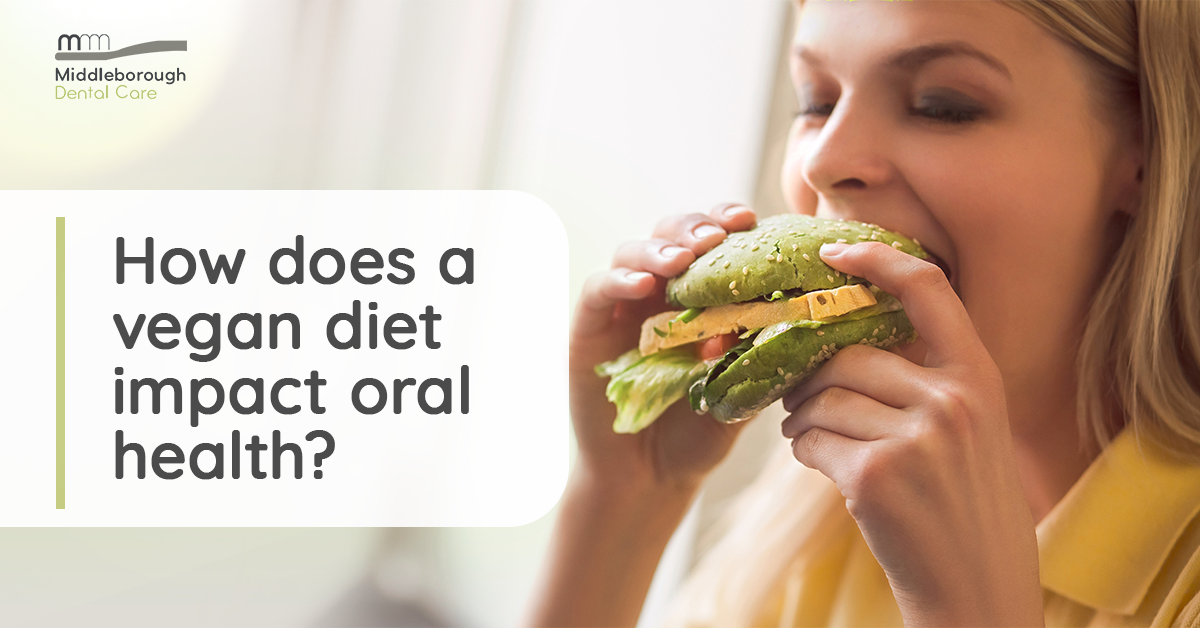
How does a vegan diet impact oral health?
We often discuss how our oral health is an important part of our overall health, and how poor oral health can have broader impacts on our entire bodies and general wellness.
At the same time, we think that most people are conscious of how their diet can affect their health, positively or negatively – including their oral health.
For example, a diet high in sugar can lead to general health problems, such as obesity and diabetes, and can also result in a greater build-up of harmful bacteria in our mouths, leading to a higher risk of tooth decay. On the positive side, a diet rich in calcium is known to help build stronger bones and teeth.
With veganism becoming an increasingly popular lifestyle choice, we need to be conscious of how a diet devoid of meat and dairy products can impact a person’s oral health.
What difference can a vegan diet make?
Even just reducing your consumption of meat and dairy products, without being a dedicated vegan, is likely to change your body’s metabolism and your oral microbiome.
The impact is likely to come from two directions: firstly, the reduced intake of a range of vitamins, minerals, and proteins readily found in animal-derived foods and, secondly, the increased intake of some of the potentially less beneficial ingredients in substitute foods.
For example, if a vegan is replacing animal-derived products with starchy, sugar-based carbohydrates (including pasta), that’s likely to contribute to what’s known as demineralisation, where essential minerals, including calcium and phosphate, are removed from the hard, protective layer of tooth enamel.
Meanwhile, a greater intake of fruit and vegetables reduces the salivary pH, leading to erosive tooth surface loss. This can also be accelerated by drinking hot water and lemon, smoothies, and juices.
Therefore, vegans have both an increased risk of dental erosion due to their high intake of acidic food and food high in natural sugar (like fruit) and a higher risk of cavities, since starchy food gets broken down in the mouth into sugar.
Alternatives can help redress the balance
As we know, calcium strengthens tooth enamel and builds strong teeth, and dairy products – milk, cheese, and yoghurt – are a primary source of calcium for most people.
As a substitute, to ensure a good intake of calcium vegans should eat beans and legumes (especially black-eyed peas and lentils), leafy greens (such as broccoli, kale, and spinach), almonds, and calcium-added orange juice or vegan milks such as almond, rice, or soy milk.
Nuts and leafy greens can also help offset the demineralisation we mentioned above.
Phosphorus plays a critical role in dental health because it naturally protects and rebuilds tooth enamel. The best sources of phosphorus are protein-rich foods like meat, poultry, fish, and eggs, but vegan options include nuts, whole grains, pulses, seeds, corn on the cob, and parsnips.
Your diet can also help to maintain and improve your probiotic oral bacteria by eating and/or drinking (with pulp) nitrate-rich high-fibre vegetables, including celery, beetroot, rocket, rhubarb, fennel, and oak leaf lettuce.
Meanwhile, vitamin A is a key nutrient in keeping your gums healthy as well as building tooth enamel. Most foods with vitamin A are orange: sweet potatoes, cantaloupe, and carrots are all vitamin A powerhouses.
Additionally, it’s a good idea for vegans to get lots of sun, because vitamin D not only boosts mineral density, but also helps carry, deposit, and absorb calcium in the bones that support your teeth.
Eating more often can be detrimental
The other potential impact of following a vegan diet is that you are more likely to eat more frequently throughout the day to maintain the recommended daily calorie intake for overall wellbeing.
Eating more frequently increases the number of acid attacks associated with chewing food (which generates the flow of saliva to begin the digestive process), and studies have already shown that vegetarians experience higher levels of acid erosion of the teeth than omnivores.
Therefore, it’s essential that vegans limit snacking as much as possible and maintain good oral hygiene by brushing and flossing regularly. It’s also a good idea to rinse your mouth with water after eating.
Oral hygiene is always a priority
If someone chooses to follow a vegan diet for health reasons, it’s likely that they will be more health conscious than the average person. This might mean that they’re a non-smoker, drink alcohol moderately or not at all, and avoid foods with high sugar content.
Hopefully that also makes them more likely to adhere to a strict oral health regimen, including regularly brushing and flossing (and six-monthly visits to the dentist).
It’s important that the toothpaste they use contains fluoride, as some vegan toothpastes don’t, but fluoride is vegan and is a vital component in supporting healthy teeth.
Given that a vegan diet is likely to accelerate tooth surface loss, it’s important that vegans use a soft-bristled toothbrush and wait 30 minutes to an hour after eating before brushing (because soon after eating your enamel is most vulnerable).
Let us know you’re a vegan
If you make us aware that you follow a vegan diet, we’ll not only have a better understanding of how to provide the best oral health care for you, but we’ll also be able to advise you on how to reduce the impact of your diet on your teeth and gums.
This might include suggesting some of the substitute foods we’ve mentioned to ensure your intake of the necessary vitamins and minerals is adequate, or some specific hints around caring for your teeth.
As we are seeing more and more vegans, we’re become better versed in how to provide the care and advice they need and each additional vegan patient we see helps add to our knowledge and experience.